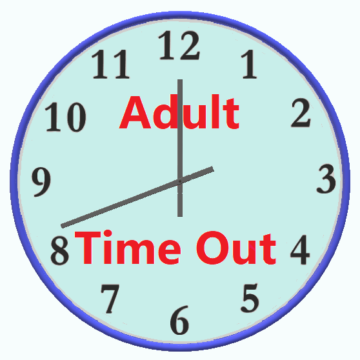Time Outs
“Time out” is an interesting phrase that has so many meanings:
• During a basketball game the Celtics can call a “time out” to rethink a strategy.
• During a football game the Buccaneers might have a “time out” for a commercial advertisement.
• If you step away from your computer, your computer can “time out” and will require you to sign back on.
• Parents will sometimes give their children a “time out” as a disciplinary action.
The “time out” described in this blog is something different. It is a “time out” that you give yourself. It is to be used when:
• You don’t think you can “sit with uncomfortable feelings”.
• You start to SAY or DO something you think you might regret.
Time outs are always for YOU, never to be “given” to another adult – EVER!! Time outs should be used to gain control over YOURSELF, NEVER to be used to:
• control another person
• avoid a situation
• ignore a situation
• get out of discussing a subject
Sometimes people will say “I’m out of here!” and then proceed to flee out of a room or home, sometimes followed by a slammed door. What this accomplishes is to:
• create a power and control dynamic of the person “huffing and puffing” as they are leaving
• stop a discussion
• frustrate and/or cause fear in the person left behind
• demonstrate poor communication skills
• assure a resolution to any conflict will not be achieved
If you are having a discussion with someone, and the two of you cannot come up with a win-win solution, pushing harder will not get you to a positive end result. Read my blog: Conflict and 4 Simple Resolutions You Should Know
Take a time out.
Steps to a Taking a Time Out
- Explain to the other person WHY you need a time out.
Example: “My mind is racing, and I am afraid I am going to say something I will regret. I need to take a ‘time out’”.
Explanation: It is important for you to let the other person know something is going on with you. Holding in your feelings or “exploding” are not helpful or appropriate.
Effect on relationships: Without the explanation of what is going on with you, it sets up a power and control dynamic.
- Identify HOW LONG you will be gone.
Example: “I will be gone for 15 minutes, and then I will be back”.
Explanation: Thinking about how long it will take you to calm down, or “put your thoughts together”, is important. Leaving the time frame open-ended leaves the whole discussion up in the air.
Effect on relationships: This gives the other person a timeline so are not to worry about when you will return.
- Explain WHAT you will do while you are gone.
Example: “I am going for a walk.”
Explanation: Letting the other people know you will be doing something constructive as you think about the discussion allow them to do the same.
Effect on relationships: This lets the other person know your time away will not be used for drinking alcohol / drugging and/or spending time with “unsafe/unhealthy” people!
- DO exactly what you said you were going to do.
Example: You said you were going to take a walk around the neighborhood, so you must take a walk around the neighborhood.
Explanation: Doing what you said you were going to do allows you time to think about the discussion and how you would like to proceed.
Effect on relationships: This adds credibility and increases trust in the relationship.
- RETURN when you said you were going to return.
Example: You said you would return in 15 minutes, so do it!
Explanation: Even if you have not been able to calm down, return when you said you would return. You can always ask for an extension of time if one or both of you are not ready to calmly discuss whatever was causing distress.
Effect on relationships: Again, this adds credibility and increases trust in the relationship.
- CHECK IN with the other person.
Example: Ask, “Are you ready to talk?”
Explanation: It is important to check in with the other person, to determine if they have had adequate time to reflect on the discussion. If not, ask them how much more time they would like. And respect their request.
Effect on relationships: Your credibility requires you to also care about the other person’s thoughts and feelings.
- COMPLETE the discussion.
Example: Talk about whatever was distressing the two of you.
Explanation: The purpose of the time out is to give you a chance to “collect yourself”. When you return after taking a walk you should be able to have a calm rational discussion.
Effect on relationships: Your credibility requires you to do what you said you were going to do.
A Balanced Life – How Adult Time Outs Can Save Your Relationship
Sometimes when you return, you perhaps realize both of you were “overreacting” and there really isn’t anything to resolve. Frequently the “time out” has been a cooling off period, allowing both of you to be more appropriate and thoughtful in your communication. At that point, healthy resolution is likely.
Quotes on Time Outs:
“If you find yourself in a hole, stop digging.” – Will Rogers (1879-1935)
“Take a rest. A field that has rested yields a beautiful crop.” – Publius Ovidius Naso, AKA Ovid (43 B.C.-17 or 18 A.D.)
With warmest regards,
To be notified of new posts like 7 Healthy Time Out Steps and How to Use Them, please enter your email address and click on the Subscribe button.









